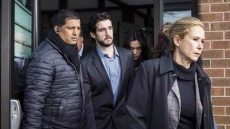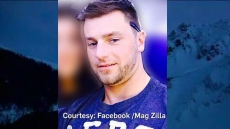OTTAWA — Senators heard an emotional appeal Wednesday to reject the federal government's restrictive approach to medical assistance in dying from the wife of an acclaimed doctor who starved himself to death to end his suffering from brain cancer.
Maureen Taylor told senators they're the last hope of people who are suffering intolerably but won't qualify for an assisted death under the proposed new law, which would require a person's natural death to be "reasonably foreseeable."
"I feel like you're our last chance to get this part right," Taylor told the Senate's legal and constitutional affairs committee.
"If you do nothing else, please, I'm begging you to get rid of that wording of the naturally foreseeable death and the word incurable."
Taylor's appeal to unelected senators was echoed by Toronto Liberal MP Rob Oliphant, who co-chaired a special joint parliamentary committee on assisted dying that recommended a much more permissive approach to the issue.
Oliphant disclosed Wednesday that he won't support the bill, which he predicted will easily pass the House of Commons with no substantive amendments.
"I'm hoping the Senate is daring enough to really do their constitutional job, respect the House of Commons but offer some amendments that didn't come up (from MPs)," Oliphant said in an interview.
Taylor's husband was Dr. Donald Low, a microbiologist credited with steering Toronto through the SARS crisis in 2003. Eight days before his death in September 2013, Low videotaped an appeal for Canada to legalize medically assisted dying, in which he vented his frustration at not being able to choose for himself when he'd had enough.
Taylor said her husband chose to stop eating and drinking but was sedated into a coma to avoid further pain — all of which only prolonged his suffering.
While she believes Low would have been eligible for an assisted death under the proposed law, Taylor said it would condemn others suffering from a host of grave conditions — multiple sclerosis, Huntington's, Parkinson's, spinal stenosis, amyotrophic lateral sclerosis and Alzheimer's disease — to years of intolerable suffering.
"Denying these patients the option of an assisted death simply because some groups classify them as vulnerable populations insults their capacity to make their own medical decisions," she told the committee.

Noting that patients hooked up to ventilators in order to breathe can legally ask to be disconnected, Taylor asked: "If we accept these decisions as rational, why the double standard?"
Taylor co-chaired the provincial and territorial advisory group which also recommended a more permissive approach to assisted dying.
Bioethicist Jennifer Gibson, the other co-chair, said the group stuck to the wording of the Supreme Court ruling which struck down the ban on medically assisted death last year. And she urged the Senate committee to take the same approach with the proposed new legislation.
The Supreme Court recognized the right to an assisted death for clearly consenting adults with "grievous and irremediable" medical conditions who are enduring physical or mental suffering that they find intolerable.
The bill takes a considerably more restrictive approach, allowing assisted death only for consenting adults in "an advanced stage of irreversible decline" from a serious and incurable disease, illness or disability and for whom a natural death is "reasonably foreseeable."
It does not allow those with capacity-eroding conditions like dementia to make advance requests for an assisted death, nor does it extend the right to assisted dying to mature minors or people suffering solely from mental illnesses.
Oliphant said he's decided to vote against the bill because every legal expert he's consulted believes it does not comply with the court ruling or the charter of rights. Moreover, he said he's attended nine town hall meetings on the subject and found that constituents overwhelmingly want the right to make advance directives.
But the bottom line, Oliphant said, is his conscience won't allow him to support it.
"To me, we had a huge opportunity from the Supreme Court to end some suffering, to alleviate suffering," he said. "My conscience won't let me vote for something that I think could add pain to a person's life."


